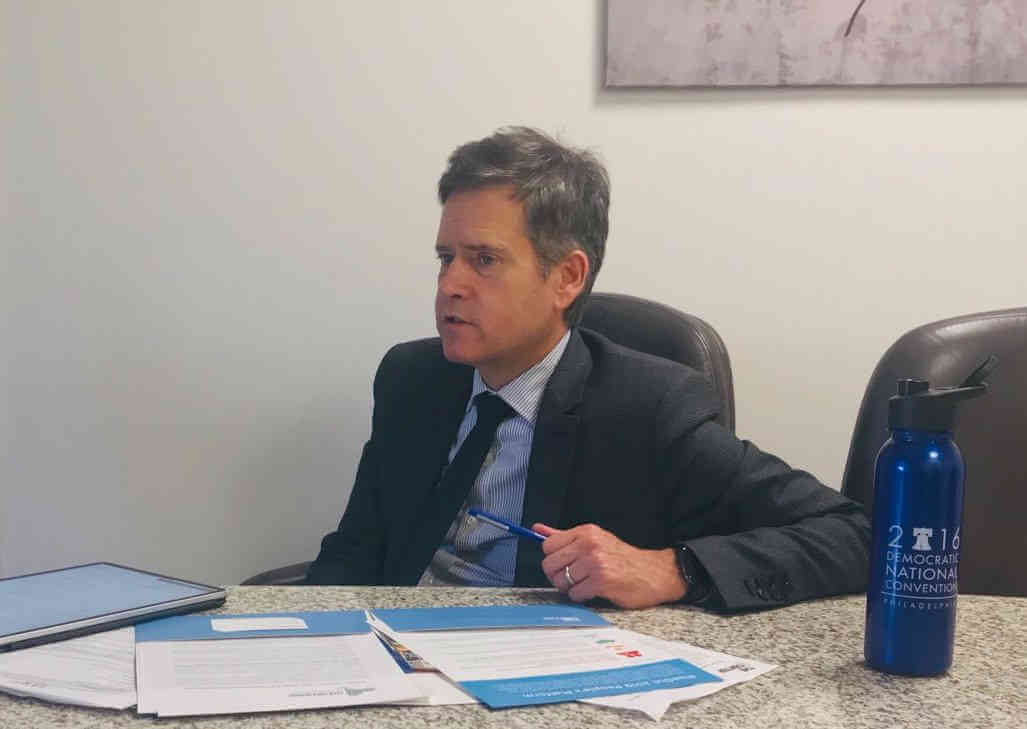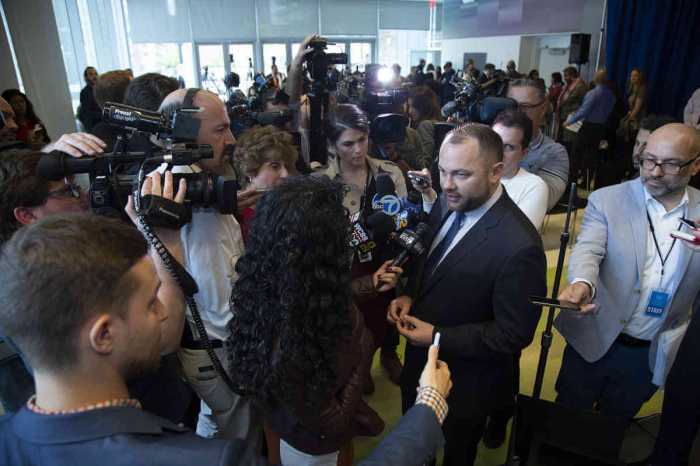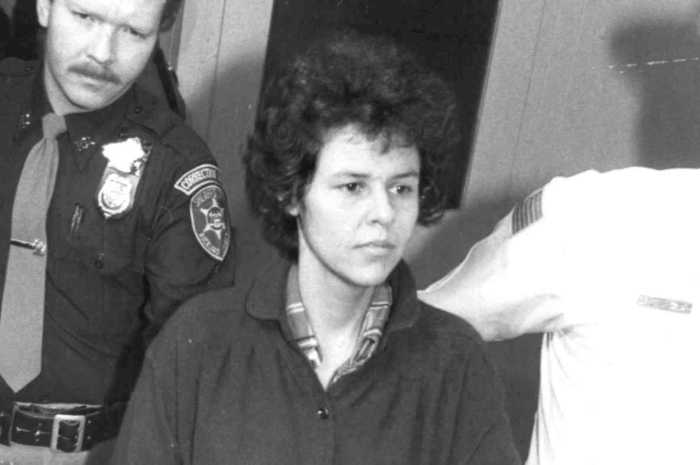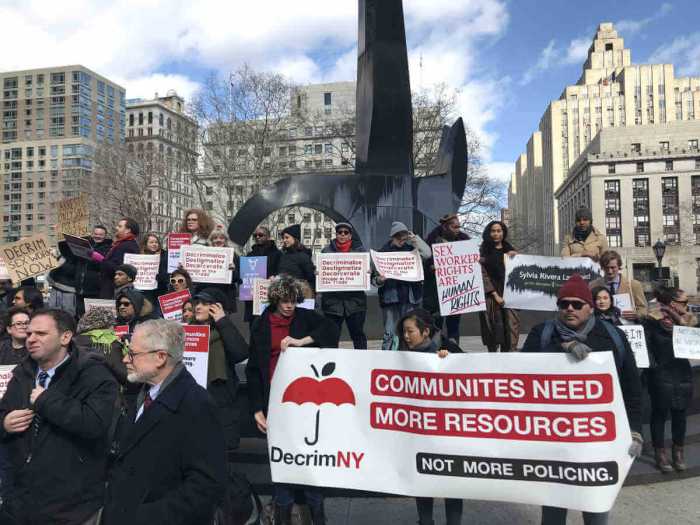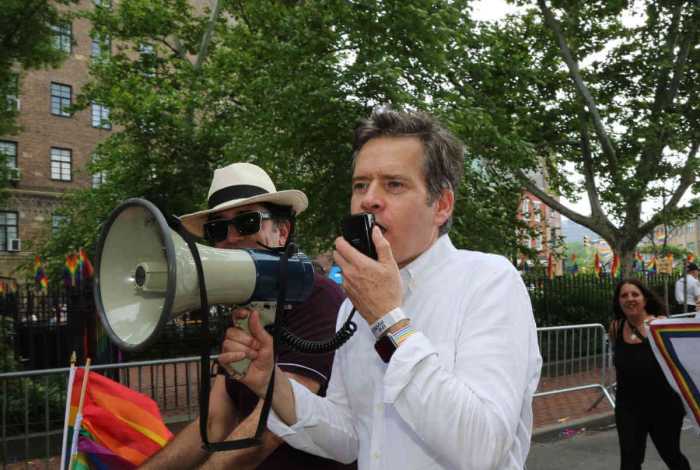When Manhattan State Senator Brad Hoylman gavels the Judiciary Committee into session on Monday morning, his colleagues will address him with a title he’s never before had in his six years in office: Mr. Chairman.
But the new Judiciary chair, who spent his first three terms in Albany in the minority, took pains last week to emphasize his respect for a colleague who has also taken on a new title in the wake of the dramatic shift in the Senate’s make-up since the November elections: Andrea Stewart-Cousins. On January 9, the six-term African-American incumbent from Westchester County was elected Senate majority leader, becoming the first woman in state history to head either chamber of the Legislature.
In an interview with Gay City News the day before, Hoylman opened up by mentioning that when Nancy Pelosi returned to the post of House speaker earlier this month, every Democrat wore a blue button inscribed with the words “Madame Speaker.”
“I took the liberty of making some buttons up over here on 38th Street that say ‘Madame Leader’ on them, in exactly the same typeface and in exactly the same color,” he explained.
To be sure, Stewart-Cousins’ ascension is historic —especially in the Age of Trump and the #MeToo movement. In an Albany culture where final negotiations on the state budget — which now totals some $170 billion — have typically been dubbed “three men in a room,” there will now be two men and one woman. Two among the trio will be African-American, including Assembly Speaker Carl Heastie of the Bronx.
Still, it is no small matter that the new chair of the powerful Judiciary Committee is the Senate’s only out LGBTQ member. And it is striking that on Tuesday the new Senate majority will keep faith with the LGBTQ community that for years has turned out to push for Democratic candidates by passing two long-stalled pieces of legislation: the Gender Expression Non-Discrimination Act, a transgender civil rights measure aimed at correcting the omission of gender identity and expression from the 2002 gay rights law, and a ban on so-called conversion therapy practiced on minors by state-certified mental health professionals.
The heavily Democratic Assembly has passed GENDA, sponsored by Manhattan’s Richard Gottfried, repeatedly for more than a decade, and it has also previously approved the conversion therapy ban, which is helmed by out lesbian Deborah Glick, also from Manhattan. Like the Senate, the Assembly will also vote on the two measures on Tuesday.
For Hoylman, who is the Senate sponsor of both bills, quick Senate action is a vindication of a critique of the former Republican majority he had made over and over again.
Noting the “appropriate symbolism” of the impending votes, he said, “Our community has been shut out of the Senate for eight years, without a single LGBTQ bill considered on the floor. This is a dramatic change and a fitting one given that it’s the 50th anniversary of Stonewall.”
He added, “It’s a sad statement about the Republicans and particularly Republicans in New York that LGBTQ issues have become partisan ones.”
Asked whether with Republican dominance of the Senate now decisively broken — Democrats hold a 39-23 edge, not counting renegade Democrat Simcha Felder, a social conservative who represents large Orthodox Jewish communities in Brooklyn — some GOP senators might join the majority on GENDA or the conversion therapy ban, Hoylman responded, “I welcome them. We don’t need them. That will be an interesting twist. Maybe with Republicans with such a diminished presence, some will feel liberated. That said, I don’t see many moderate Republicans left in the Senate.”
Despite the prospects for easy passage of two cherished LGBTQ legislative priorities, that was not the topic Hoylman led with in his interview. Instead, he first mentioned the responsibility of his Judiciary Committee to push back against the “onslaught of recriminations and encroachment toward our judicial system from Trump and his cronies.” One key element there is “keeping ICE out of our state courts.” Not only have some undocumented immigrants been taken into federal custody while appearing, either as a defendant or a plaintiff, in state court, Hoylman said, but worse is the deterrent effect the threat of apprehension has on immigrants seeking justice.
“Let’s say you’re in an abusive relationship,” he said. “You don’t have any choice but to stay in that untenable situation out of fear of being extradited.”
Another key priority Hoylman mentioned was enactment of the Child Victims Act. Although there are currently some differences between the Senate and Assembly versions of this measure — which he said he and Assembly sponsor Linda Rosenthal are working to iron out — it basically aims to raise the statute of limitations in criminal cases for sexual abuse of a minor, allow survivors to make civil claims up to the age of 50, and create a one-time window for survivors to come forward about abuse suffered no matter how long ago.
The Catholic Church has been among the most active institutions lobbying behind the scenes to forestall this legislation, despite the establishment of victims’ compensation funds by the New York Archdiocese and some others around the state. Last week, in a Daily News op-ed, Cardinal Timothy Dolan warned against any measure that would have the effect of “breaking” the Church.
Asked about that warning, Hoylman responded, “There’s no example of a window period revival having that impact. No church body, to my knowledge, has involuntarily filed for bankruptcy. They’ve done that to protect their assets, but they haven’t done so because they ran out of money.”
Senate Democrats, he said, are committed to taking action on the issue this session, with many newly elected members, especially from Long Island and the Hudson Valley, having won by emphasizing their support for the Child Victims Act and the opposition of their Republican opponents.
Another issue on which Hoylman favors movement is enactment of the New York Health Act, creating a single-payer universal care system for the state. On this issue, too, he said, support among Senate Democrats is very high. At the same time, he acknowledged, study, education, and hearings are needed — particularly since the issue has never received formal Senate investigation in the past. A favorable review of the legislation by the RAND Corporation last year, he said, addresses concerns some legislators and others have about cost, but Hoylman is not certain action can be completed in this session.
Still, he said, a single-payer approach is not a question of “if, it’s when.”
Hoylman is confident that after the budget, due by April 1, is enacted, the Legislature can act to not only renew rent stabilization laws, but to reverse the trend of recent years in which, according to a study by City Comptroller Scott Stringer, more than 400,000 units of affordable housing were lost between 2000 and 2012. Marijuana legalization, now squarely on the agenda given Governor Andrew Cuomo’s endorsement last month, will depend, Hoylman said, on the establishment of a regulatory regime and will also likely face questions, especially from suburban legislators, about the risks of driving under the influence.
Hoylman is hopeful the Legislature will approve a bold congestion pricing plan, though he acknowledged that even some city legislators represent districts without a single subway station, complicating agreement on the details of any such scheme, especially regarding the use of the revenues it generates. And, he noted, estimates on what congestion pricing can generate range from $6 to $8 billion, while Andy Byford, president of the New York City Transit Authority, estimates that the subways and buses need a $40 billion investment.
“Where’s the money going to come from?,” Hoylman said. “It’s not going to come off the backs of riders, if I can help it.”
Beyond GENDA and the conversion therapy ban, the new Judiciary chair has a host of other LGBTQ-focused concerns. On health care, he wants to see wider available of PrEP and PEP — first, through a mandate that they be covered in all insurance plans, and later by being made available free of cost — a restoration of funding for the statewide network of LGBTQ-specific health and human services from the current level of $4.4 million to at least the pre-2008 recession level of $9 million, and greater resources for gender transition care and HIV and hepatitis C treatment in the state’s prisons.
Hoylman also supports a strengthening of the anti-bullying Dignity for All Students Act, greater funding for homeless youth and the providers who serve them, an LGBTQ bill of rights for seniors in long-term care facilities, a non-binary gender option on driver’s licenses, a ban on “gay panic” and “trans panic” defenses in violent crime cases, and a restoration of the 53 state benefits currently denied former military service members discharged under Don’t Ask, Don’t Tell.
One other measure close to Hoylman’s heart is a reform of the state’s gestational surrogacy laws that largely ban would-be parents from contracting with surrogates. He and his husband, David Sigal, were forced to work with surrogates out of state to parent their two daughters, and Hoylman said that opening up surrogacy options here in New York has a lot of support, especially among newer members of the Legislature. Still, he conceded that more education is needed, particularly among those elected officials “who have never thought about it.” The aim of the legislation, he said, is to protect all parties in a surrogacy contract, ensuring each has legal representation and that the woman acting as surrogate has sole and absolute control over all decisions related to her health while she is carrying a fetus to term.

